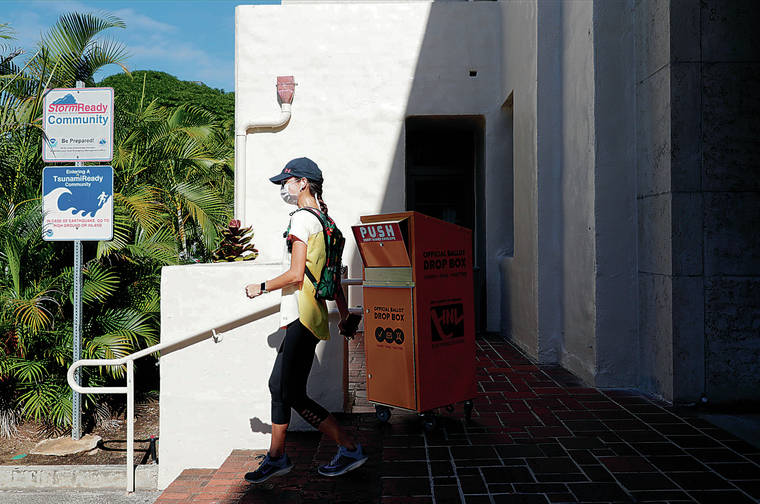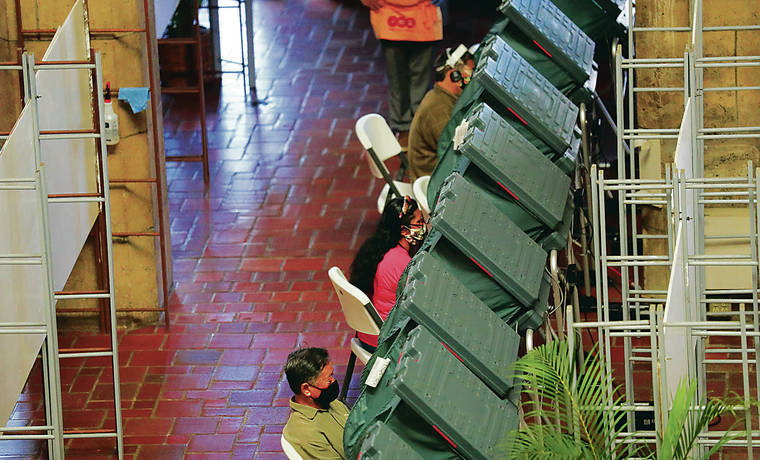Perfect storm results in record voting in Hawaii

JAMM AQUINO / JAQUINO@STARADVERTISER.COM
Kakaako resident Jennifer Hollowell left Honolulu Hale after turning in her ballot to one of the official drop boxes on Thursday

JAMM AQUINO / JAQUINO@STARADVERTISER.COM
Voters used the machines inside Honolulu Hale to cast their ballots.


A convergence of forces has turned chronic voter apathy in recent years in Hawaii into record ballots cast — even before Tuesday’s general election.
The ease of mail-in voting, President Donald Trump’s reelection bid, concerns about the economy, and fears about the COVID-19 pandemic are motivating factors in the 2020 election, amplified by information and pressure via social media.
“People feel the connection to politics in their daily lives right now more than ever in living memory,” said Colin Moore, an associate professor of political science at the University of Hawaii and director of the Public Policy Center at UH. “Voting is one way to feel empowered.”
The result has brought out “a combination of first-time voters and people who are intermittent voters or haven’t voted in a long time,” Moore said.
They include Jennifer Hollowell, 33, of Kakaako, who took multiple cell phone pictures of herself depositing her first vote into a Honolulu Hale ballot box on Thursday.
She documented her inaugural vote in order to post the evidence to her Instagram account, where friends and followers have been encouraging voter turnout.
Don't miss out on what's happening!
Stay in touch with breaking news, as it happens, conveniently in your email inbox. It's FREE!
“I just felt like it was necessary this time,” Hollowell said. “With everything going on in 2020, it seemed important. … The whole process was easy.”
Hollowell likely would have voted for Trump in 2016, but said she needed to actually vote this time because Trump has run the country “differently than I expected.”
Across the island in Waipahu, Dan Foster, 61, believes that enthusiasm for Trump is likely responsible for some of the record voter turnout on Oahu that’s already even higher than the previous record 308,443 votes cast in 2008 for the first term of native son Barack Obama.
“Trump is bringing out votes,” said Foster, a reliable Republican voter.
But one of Oahu’s first-time voters includes Foster’s 63-year-old wife, whom he declined to name, who offset Foster’s vote by choosing former Vice President Joe Biden.
“I voted the Republican Party and she voted Democrat,” Foster said. “She thinks the current president is mean-spirited. That’s probably an accurate statement; however people forget that Mr. Biden had many years in government and I don’t think we were better off.”
Like Prof. Collins, Foster believes voter enthusiasm locally and across the country is driven by additional forces beyond feelings about Trump.
“Nationally you have the people who vote as they typically do along party lines,” Foster said. “You have those people voting Black Lives Matter, that whole genre of people, and you have people who vote as they see how the government’s handled the COVID-19 virus response.”
Moore believes some of the 2020 enthusiasm to vote in Hawaii can be traced to protests in 2019 over the proposed Thirty Meter Telescope at the summit of Mauna Kea on Hawaii island. The Mauna Kea protests — magnified via social media around the world — were followed by different protests of Oahu’s Kahuku wind farm and plans for a park in Waimanalo.
And among Hawaii’s multi-generational families — many stuck at home and idled from work by the novel coronavirus — this year’s first-time arrival of all mail-in ballots likely led to additional family pressure to vote, Moore said.
That’s what happened in Tina Gomez’s home in Hauula, where she and her husband finally convinced their 24-year-old daughter to vote for the first time this year.
“She used to say, ‘Why bother? Our vote doesn’t count,’” Gomez said after delivering the family’s mail-in ballots to Honolulu Hale. “So I’m happy that there’s (increased voter) interest.”
All the factors, Moore said, have added up to “a perfect storm of reasons that would motivate people to participate.”
But above all else, Moore said, is the divisive issue of who will be America’s next president that will be decided on Tuesday.
“Frankly it’s their hatred of Donald Trump or their enthusiasm for Donald Trump,” Moore said. “This is a time when people want their voices heard.”
Mike Beverford, 73, of Kalihi is a consistent voter but said he believes more people are turning out to vote this year for the same reason.
“It’s probably because of Trump,” Beverford said outside of Honolulu Hale. “You’re either crazy for him or crazy against him.”
Already this year, voter enthusiasm has shattered records in an island state that often lagged the country in voter turnout.
In August, Hawaii voters set records for registered primary voters at 795,248 and votes cast in a primary, 380,152.
Three weeks before the general election, another record was set of more than 832,000 registered voters across the state. Hawaii had never seen 800,000 registered voters — the previous record was established in the 2018 general election at 756,751.
Then last week, a record 313,320 votes already had been cast on Oahu, setting a Honolulu record.
“Everyone wants to put in their 2 cents,” said Arnel Ilano, 53, of Pearl City, who dropped off his mail-in ballot outside of Honolulu Hale.
Hawaii will likely never reach the record 93.6% voter turnout that was set in 1959’s general election, the year that Hawaii became America’s 50th state.
But this year’s total votes could challenge the record 456,064 votes counted in the 2008 general election.
Moore compared this year’s voter enthusiasm to the general elections of 1970 and 1972, when nearly 85% of registered island voters cast ballots.
“It was a combination of Vietnam and a generation of people who felt passionate about their right to vote,” he said.
For the current generation, especially those who have yet to vote, several voters at Honolulu Hale pulled out a familiar, hard-to-argue-with chestnut on why people should vote:
“If you don’t vote, you cannot complain,” said George Chan, 70, of Waialae Iki.
Darrel Hoke, 55, also of Waialae Iki, later put it a slightly different way.
“If you don’t vote,” Hoke said, “don’t grumble.”
—
Voting in Hawaii
Even if you have never voted before, or are still not registered, it’s not too late. If you’re a Hawaii resident you can still register and vote in your county — even on Election Day. Voter service centers are open Monday from 8 a.m. to 4:30 p.m., and Tuesday from 7 a.m. to 7 p.m.
Oahu
>> Honolulu Hale
>> Kapolei Hale
Hawaii island
>> West Hawaii Civic Center
>> County of Hawaii Aupuni Center
Maui
>> Lanai Police Station
>> Mitchell Pauole Center, Kaunakakai
>> Velma McWayne Santos Community Center, Wailuku
Kauai
>> Piikoi Building, Lihue

 Stay updated on Hawaii and national elections coverage
Stay updated on Hawaii and national elections coverage


